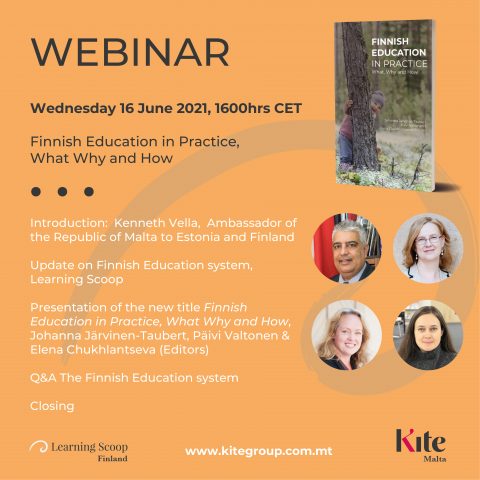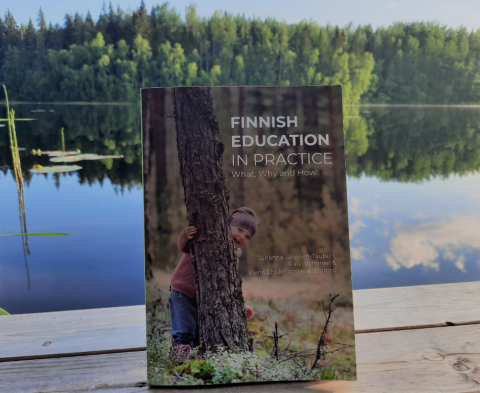Finnish Education in Practice webinar was a success! What next?
The take-aways of Finnish Education in Practice webinar are surely countless, yet most or perhaps all of us, have realized at this point that Finnish Education is not a miracle, and if it were, it would not happen perhaps then again, and it might not be applicable elsewhere. Rather, this world reputable system is built and have been based on strong fundamentals, which have been continuously on constant refining and development by the Finnish education community. A community that does not only involve education experts, but also parents, education providers, and a large spectrum of education stakeholders to always produce a curriculum that is centred on a learner.
 This inclusion and learner-centric concept would not have existed and observed its fruits if there were not the following six cornerstones as mentioned in the webinar:
This inclusion and learner-centric concept would not have existed and observed its fruits if there were not the following six cornerstones as mentioned in the webinar:- Equality and equity: everyone in Finland is eligible to receive equal access to knowledge acquisition and learning opportunities. Besides, every learner is treated individually as per their learning abilities and capacities, and hence Finnish schooling refuses to impose one learning formula for all. In fact, the new Finnish national core curriculum has only outlined the borderlines for creating teaching content and delivering lessons but granted full rights to teachers and schools to freely tailor their teaching approach based on their learners’ criteria.
- Trust and responsibility: “Trust is intertwined throughout the Finnish education system and can be found at its every level”. (Finnish Education in Practice: What, Why and How 2021, 5). Trust in the Finnish education circle is seen as a highly strong factor for the success of its education system. Parents trust schools, education providers trust schools, school management trusts teachers, students and teachers exchange trust. This element of trust exists due to what is known as “educational partnership”, whereby every party in the circle contributes constructively to cater for the best of a learner’s interest.
- Autonomy: Qualifying to earn a teacher title in Finland is highly demanding, and teaching is recognized as a high-expertise profession. Therefore, when graduating and attending for their roles, teachers are granted full autonomy and trusted with their teaching style and contribution to pedagogical development, without any imposed inspection or supervision. Teachers are regarded as the most knowledgeable and qualified professionals to be undoubtedly trusted in serving their students in their best interests.
- Collaboration: Competition has often been associated with the enhancement of quality standards in education; comparing students’ academic performances is perceived as an effective tool to provoke the interest of learners and aspiration for better and better grades. However, Finnish education experts and their approach prefer to implement collaboration rather than competition, which limits creativity and tends to constrict learning performance on grades. Educators are consistently encouraged to share their successful recipes with their fellows to equally enjoy the benefits for the best of their learners. Students are neither compared nor contrasted with their peers in class, but a student development is assessed by comparing his/her previous performances. Simply, the Finnish education community regards collaboration as a mean of enriching learning, encourage innovation, hence continuously promotes education quality in favour of learners.
- Learner-centred: Schools, principals, staff, and teachers work collaboratively to cater for a child/student and provide them with the best possible learning environment and conditions to support their learning journey. This approach requires educators and school management boards to carefully listen to their students and translate their voiced concerns and views into actions to implement the required changes to constantly enhance their learning environment based on their demands and preferences.
- Science-based: Often not associated with its system and success, Finnish education is strongly based on scientific research, and has always adopted its pedagogy based on matters like educational psychology. Learners are not treated as passive agents in receiving the information, but rather are actively enabled and encouraged to construct their knowledge through their social, physical, and emotional interactions with their peers and learning environment. The likes of frequent recesses, outdoor activities, free play, social contacts with their peers outside the classroom serve to equip the learner with further learning opportunities away from the theoretical and class-based lessons. This socio-constructivist learning approach enables the student to apply and reflect his/her learning attainments on real-life situations.
The above-mentioned practices that reflect the Finnish education are only a glimpse of what the “Finnish Education in Practice: What, Why and How” book explains and a paraphrase to what our experts introduced and highlighted in the webinar, during their presentation and when answering your numerous enquiries.
We hope you enjoyed the webinar as much as your final positive comments manifest, because this well-received experience only encourages us to organize more sessions with different topics and perspectives shedding more lights on the phenomenal Finnish education.
Our team would like to thank Mrs Pamela Zerafa warmly and sincerely for her professional and entertaining hosting experience throughout the webinar, Dr Kenneth Vella, ambassador of the Republic of Malta to Estonia and Finland, for his captivating and profoundly -worded introduction, and our experts Mrs Johanna Järvinen-Taubert, Mrs Päivi Valtonen and Mrs Elena Chukhlantseva for sharing some of their extensive expertise about Finnish education and enlightening us with some valuable insights revolving the Finnish education system. We also would like to wholeheartedly thank you all our dear global audience for sparing some of your precious time to attend this worthwhile experience and being actively interactive, despite the time differences and distances.
For now, stay tuned for further announcements, and enjoy reading our complete book Finnish Education in Practice: What, Why and How.

When ever you are enjoying few days off or are on vacation, reading books is a great way to relax and learn something new!
